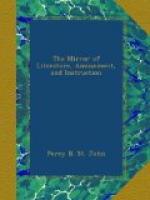I called on Lord Byron the same day, and mentioned to him that Walter Scott had been with me that morning. His lordship observed, “Then, Nathan, you have been visited by the greatest man of the age, and,” continued his lordship, “I suppose you have read Waverley.” I replied in the negative. “Then,” returned his lordship, “you have a pleasure to come, let me recommend it to you; it is decidedly the best novel I ever read; you are of course aware that it was written by Walter Scott.” It had at this period scarcely been rumoured that such was actually the case, but Lord Byron was more than usually positive in identifying the author with his writings.
In speaking of Moore, as a poet, Lord Byron acknowledged his powers, and spoke highly of his effusions generally. “The Irish Melodies,” said his lordship, “will outlive all his other productions, and will be hailed by the Irish nation as long as music and poetry exist in that country.”
Many coincidences in life may seem to border on superstition, without any existing reality; and, although never personally taxed with the sin of superstition, yet the following circumstance brings strongly to my remembrance what passed relative to my friend and patron.
I was with Lord Byron, at his house in Piccadilly, the best part of the three last days before he left London, to quit England; I expressed my regret at his departure, and desired to know if it was really his intention not to return (little anticipating what eventually took place;) he fixed his eyes upon me with an eager look of inquiry, exclaiming at the same time, “Good God! I never had it in contemplation to remain in exile—why do you ask that question?” I stated that such a report had been rumoured. “I certainly intend returning,” continued his lordship, “unless the grim tyrant should be playing his pranks on me.”
He appeared very anxious for the voyage, and walked about the room in great agitation, waiting the return of a messenger who had been sent respecting some delay which was likely to take place; the messenger however soon entered, and presented him a letter, which his lordship opened with great eagerness. In reading the letter his countenance, like the earth illumined by the re-appearance of the moon, after having been obscured by dark clouds, brightened up, and at the close he exultingly exclaimed “this is kind—very kind—Nathan! to-morrow I quit.” I soon after left him; he shook me heartily by the hand, and left with his impression a fifty pound note, saying, “Do not be offended with me at this mode of expressing the delight you have afforded me—until we meet again, farewell!—I shall not forget my promise.” His lordship here alluded to some promised verses.
Having left the room he called me back, and reverting once more to my first allusion of the rumour about his not returning, laughingly said, “Remember, Nathan, you shall certainly see me again in body or in spirit.”




